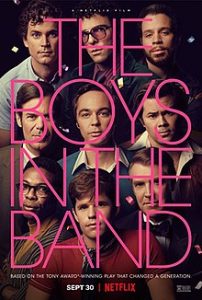The Boys in the Band-2020
Director Joe Mantello
Starring Jim Parsons, Zachary Quinto, Matt Bomer
Scott’s Review #1,073
Reviewed October 21, 2020
Grade: A-
One may ask oneself why bother checking out the 2020 version of the legendary (and dark!) 1970 stage turned cinematic rendition of the sniping and vicious gay drama The Boys in the Band?
Primarily because of the terrific cast, a cast featuring the troupe who starred in the recent 2018 stage revival. But more than that, the film feels surprisingly modern and relevant, providing a message of hope that the original did not contain.
Crucial and historical to point out is that every principal actor is openly gay, and their characters are gay or bisexual. My, how much progress has been made for actors when not too long ago an “out” actor risked both reputation and career for the price of his truth.
This is monumental.
The remake wisely keeps to the crucial period of 1968, and really, how could a modern setting work at all? Being gay in 1968 is nothing like being gay in 2020; I don’t care if it is the Upper East Side of Manhattan.
To bring this film to any other time would diminish its power and importance. If anything, it makes one proud of how far the LGBTQ+ community has come, though there are further advancements left to make.
Alas, the Vietnam era is safely intact, during a time when a strip of gay bars and a group of gay friends were the only things to keep a gay man from going crazy, regardless of how abusive they were.
This will hopefully teach young gay viewers, or anyone else, what being a gay male was like over 50 years ago. When the rest of the world was deemed “normal” and you were cast aside as either a sexual deviant or a head case, this is powerful.
Self-hatred, denial, or the closet were commonalities.
The Boys in the Band has no females save for a blink and you’ll miss it moment featuring a snooty neighbor.
Important to realize is that the film is a pre-A.I.D.S epidemic in a time of carefree love and endless hookups, where booze and drugs were a necessary escape and usual was to feel out of sorts regularly.
A few characters are effeminate. One is presumably bisexual and closeted, and one is masculine and recently divorced from a woman, now cohabiting with a male lover; one is black, and one is an escort. Each character comes from a different walk of life, yet they are bonded.
The running of the gamut of unique types and personalities is part of why I love this story.
The events commence one evening when Michael (Jim Parsons) throws a birthday party for friend Harold (Zachary Quinto) at his apartment. They are joined by other friends, Donald (Matt Bomer), Hank (Tuc Watkins), Larry (Andrew Rannells), Bernard (Michael Benjamin Washington), and Emory (Robin de Jesús).
Guests include Cowboy (Charlie Carver), a “birthday present” for Harold, and Alan (Brian Hutchison), a college friend of Michael’s.
As the booze flows, the talk gets vicious and the claws come out.
The men, prompted by a drunken Michael, play a daring game of “telephone”. Each guest is dared to call the one person he truly believes he has loved. With each call, past scars and present anxieties are revealed in a torturous fashion.
This is when the film gets interesting.
Bernard and Emory bear the brunt as their phone calls take a tremendous toll on each other.
Parsons and Quinto are the standouts. As the lead, the character of Michael seems stable at first. He is stylish, well-dressed, and lives in a reputable apartment. Though unemployed, he once traveled the world.
Parsons slowly unleashes the vicious fury contained within Michael, the more he drinks. He enjoys hurting others just as he has been injured.
The catalyst for his character is Alan. Are they in love? Is Michael in love with Alan? Alan takes a fancy to masculine Hank.
Quinto, as Harold the self-professed “ugly, pockmarked Jew fairy”, is becoming increasingly morose about losing his youthful looks and his ability to attract cute young men.
The catalyst to his character is Cowboy, who has those qualities that Harold lacks.
Strangely, Harold and Michael are best friends, both loving and hating each other. After brutalizing each other with words, Harold exits the apartment, announcing he will call Michael tomorrow. They’ve been through this before and probably will again.
No, The Boys in the Band circa 2020 is not quite on par with The Boys in the Band circa 1970, but this is merely because brilliance is a tough act to replicate.
The modern telling is an absolute joy and will hopefully recruit fresh audiences to the perils and brutality of being gay in another time.
Thanks to Ryan Murphy for adapting this project to Netflix as part of his United States $300 million deal with the streaming platform.
